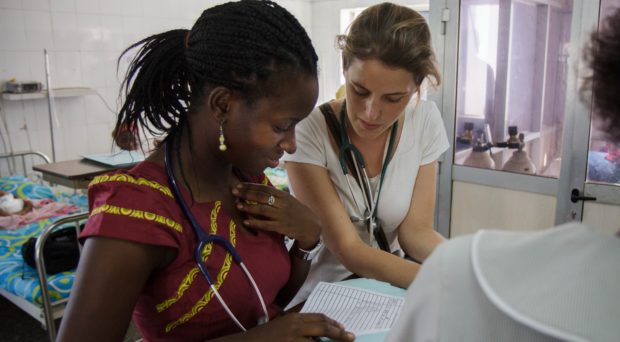
The NHS is synonymous with Britain, yet almost 15% of its workforce are originally from outside of the UK. It has always been so. In 1949, during its first full year of operating, the NHS launched a mass recruitment of health workers in the Caribbean. By 1962, over 10,000 medical students had been recruited from abroad. Quintessentially British the NHS may be, but it is profoundly shaped by the contribution made by overseas health workers and don’t we know it.
When the government temporarily imposed visa restrictions on the recruitment of doctors from India last month everyone, from The Daily Mail to The Guardian, rushed to defend the right of the NHS to recruit from overseas.
This is problematic, for two reasons.
First, there has been scant regard for the impact that recruiting health workers from overseas has had on their countries of origin. Take India for example, which has just 0.7 doctors per 1,000 people – dramatically lower than the World Health Organization’s (WHO) global recommended average of 2.5 doctors per 1,000 people. Is this really a country that can afford to export 600 doctors to work in the NHS?
Secondly, the NHS is operating in an increasingly competitive world. Competing with others for health workers has worked for us in the past, but will it in the future, and at a time when we are exiting from the EU? It seems unlikely.
We must shift the compass from competition to collaboration and the NHS can play a pivotal role in this.
However, it is not just the UK and India that are facing shortages. By 2030, the WHO estimates that the shortfall will reach 18 million. German charities are warning that over 100,000 extra health care workers are needed to meet the needs of their elderly population, China is short of at least 200,000 paediatricians, 161,000 general practitioners, 40,000 psychiatrists, the list could go on.
So what is the alternative?
We must shift the compass from competition to collaboration and the NHS can play a pivotal role in this, forging new links with health systems overseas, becoming a global force operating in philanthropic and commercial ways.
We should continue to attract health workers to the UK, for training and education purposes, with a view to them returning home to up-skill health workers in growing numbers. However, we must also respect the right of health workers that decide to migrate to the UK, who play a vital role in a global NHS that is open to learning from the world. In this way we can derive mutual benefits whilst respecting the spirit of international recruitment codes.
Some of the foundation stones for this global NHS are in place.
My own charity, the Tropical Health and Education Trust (THET), has partnered with 130 NHS Trusts since 2011. Through funding from the Department for International Development (DFID) they have delivered training to over 84,000 health workers across 31 countries. Fascinatingly, and perhaps unexpectedly, the 2,000 staff who have delivered this training document countless examples of returning home fresh with new thinking that brings benefit to the NHS.
These initiatives lay the foundations for a global NHS, responsibly engaged with partners overseas, working in our mutual interests whilst respecting the spirit of international recruitment codes.
In April, the Department of Health and Social Care announced a global nursing partnership with Jamaica. This will see Jamaican nurses work in the NHS for 3 years to gain specialist skills – which they will then take back to the Jamaican health system. All in the hope that up-skilling nurses will not only strengthen the respective health systems and plug workforce gaps in the short term, but will build a workforce ready to receive new recruits when and if the time comes.
Elsewhere, there are growing commercial ties. King’s College Hospital has expanded their services to Saudi Arabia in a deal worth $200 million. As the Rt Hon Alistair Burt, Minister of State for the Middle East at the Foreign and Commonwealth Office and Minister of State at the Department for International Development, noted; ‘The UK public and private healthcare system is considered among the top in the world. We are extremely excited to expand British healthcare internationally’.
These initiatives lay the foundations for a global NHS, responsibly engaged with partners overseas, working in our mutual interests whilst respecting the spirit of international recruitment codes. This is why, on its 70th anniversary, THET is calling on the government to enshrine the global nature of the NHS in its constitution, a clause that will commit the NHS globally in ways which will benefit patients at home whilst also enhancing other countries’ abilities to build robust health systems. This, surely, is the right way to express the principles and values that have shaped the NHS in a way that is fit for today.
Our annual global health conference will explore this theme along with others at Imperial College London, 27th – 28th September 2018: www.thetconference.org
This was a very good article concerning the pressing need for ongoing collaboration with healthcare systems in less advantaged countries. It also speaks to the need for international healthcare standardization of both education and clinical care. Does the author see a future of a ‘real’ world health congress providing core basic standards and metrics? How do we begin the process of individual engagement with hospitals abroad?